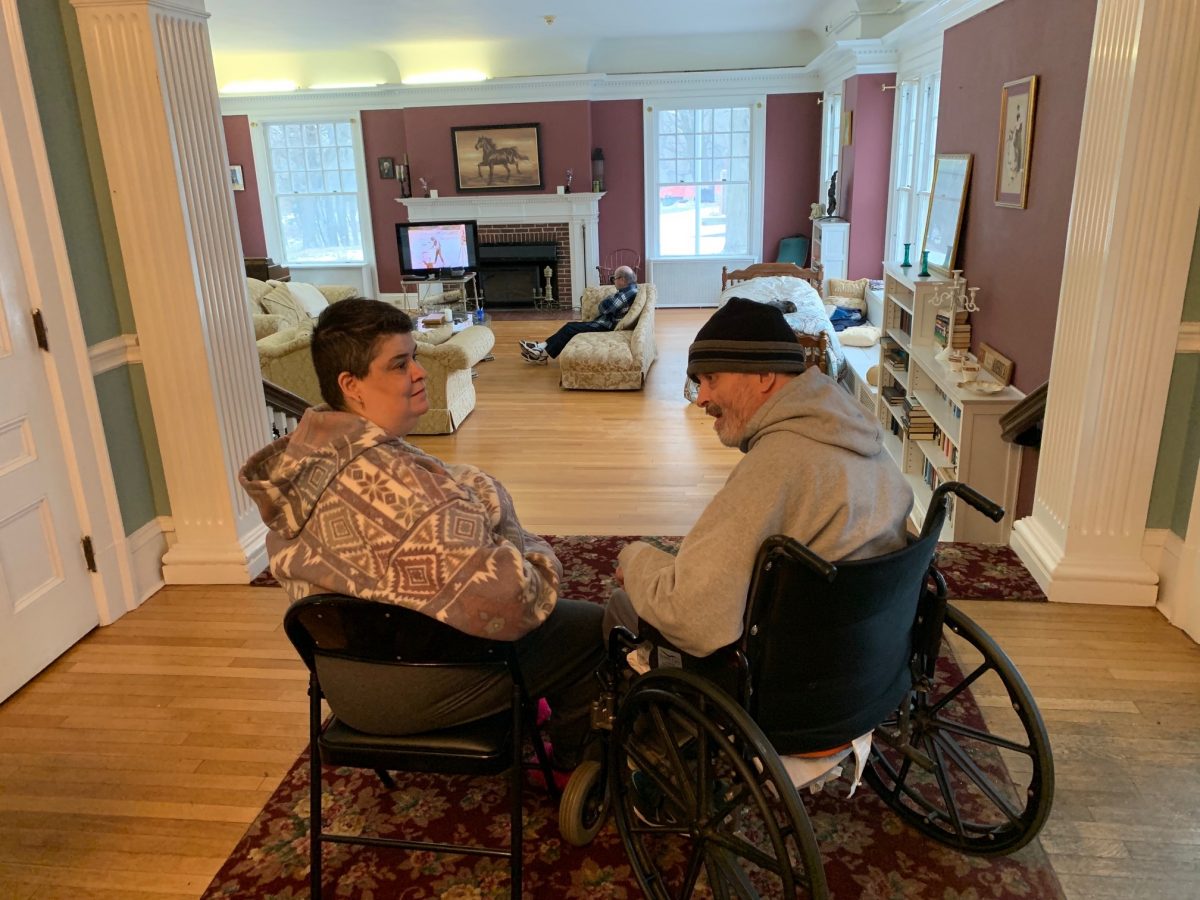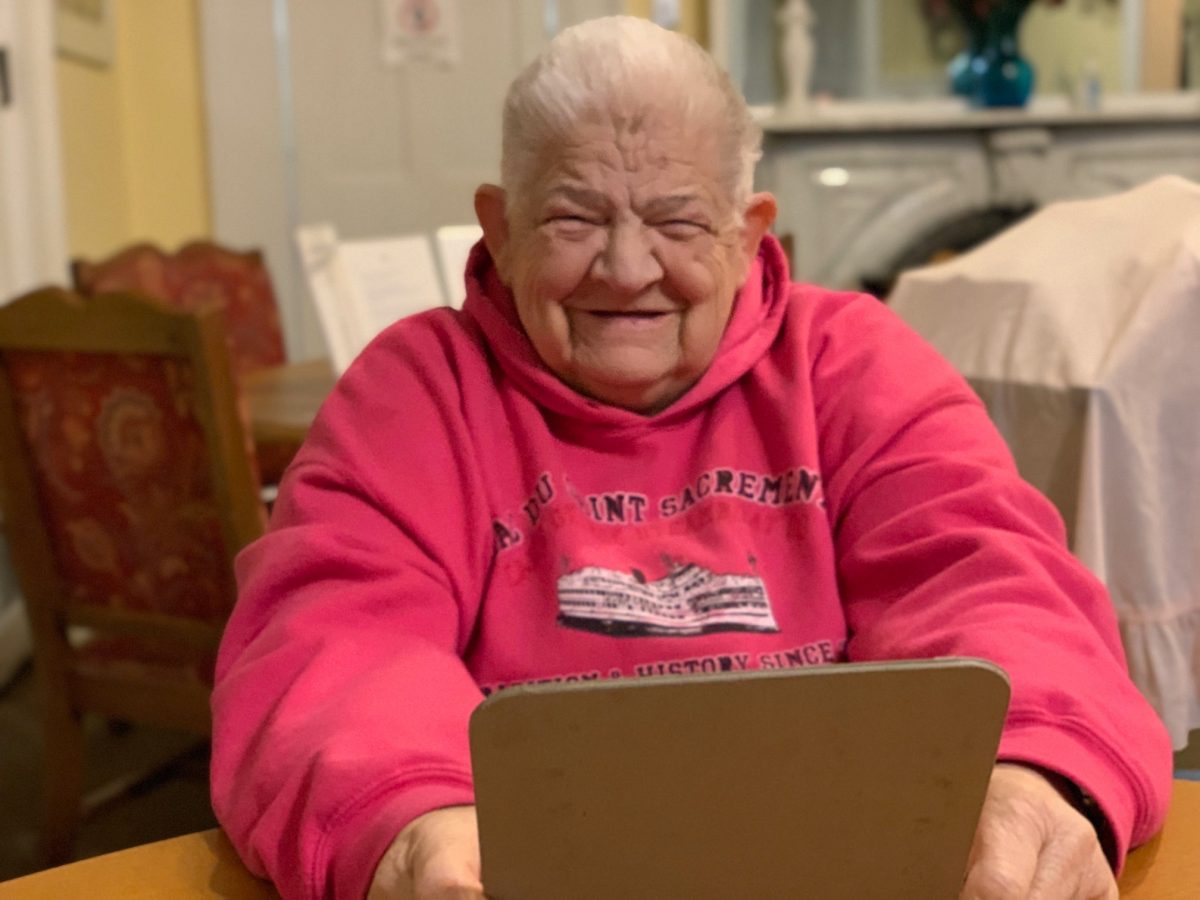My work with the residents of the Mansion began as a great experiment for me. Like most people, I was busy living my life and paying my bills and trying to get my head straight.
I tended to ignore those places where the elderly came when they could no longer take care of themselves. I had no sense of what went on behind those usually landscaped and quiet doors.
It was my hospice volunteer work that brought the elderly to my attention, they were not what I expected. They are quite full of life and love and longing.
I started going to the Mansion, a Medicaid facility in my town once a week with Red, I got hooked there. I loved the staff, the aides with big hearts, Katie, then Morgan, now Kassi, the Mansion directors I’ve worked with, were all open to me and the work I wanted to do.
Each one is a remarkable person, they work unbelievably hard and care unbelievably much. When I think of all the difficulties I had working with some of the refugee groups, I think of the Mansion. I have never had a difficult moment there.
It was there I came to understand the proper scale, I call this work Practical Good In The Real World. We don’t make miracles, we will the holes in people’s lives when we can.
.They let me in, always supported my work, always welcome it, always trusted me to write honestly, never once tried to tell me what to say or see.
That is rarely true at most elderly care facilities or non-profit institutions. People like me wandering around make many administrators very nervous, just ask RISSE. The Mansion never has anything to hide or fear, always made me feel at home.
I had visited a lot of assisted care places by then, and the Mansion was/is unique.
For one thing, the setting is warm and home-like, no antiseptic Holiday-Inn like buildings with long corridors and shiny floors. Because it was a family home, it feels like one. Most of the people who go there get comfortable right away.
The Mansion was build as a mansion for the very wealthy McLellan family, and it has a warm and home-like feel.
I don’t quite know how they manage to do it, but they seem to find the nicest, warmest and most caring young people to work there. I don’t feel the warmth and caring for other places the way I feel it at the Mansion.
The Mansion is a Medicaid facility, they don’t get the richest people, or have the biggest budgets. The residents have many needs, often small, often quite personal, these needs are accessible to people like me. They have very limited resources. And they are accessible people like you, the Army Of Good.
I have worked hard to earn the trust of the staff and residents, and slowly, it has come. I will never violate that trust.
Here, we can actually afford to help people. I am a whiz now at buying special order socks, underwear, bras, sneakers and shoes, nightgowns, bathrobes, scarves, hats and jackets, large print books, realistic baby dolls and stuffed animals.
I am known at every Thrift Store in the area, and I can navigate the most remote corners of Amazon in a blink. I went to visit my Mother-In-Law Christmas week, and she let drop that she needed new cotton socks. I was on my Iphone in a flash and the socks arrived two days later. She couldn’t quite believe it.
The Mansion resident’s needs are not large like the refugees, they are small, like people at the edge of life who have never had much and who always expect little.
Doing this work, I developed my idea of small acts of great kindness, practical good, real work for real people in the real world. An act of good every day.
This fits with the people who call themselves the Army of Good. Some are my readers, many are not. They live all of the country, they send me $5 bills and checks for hundreds of dollars, when it is needed.
We are not a wealthy army, the Mansion residents give us the opportunity to do good without being billionaires. I am grateful to them for that. “I live in Kansas, far out in the country,” wrote Janet,”the Army of Good gives me the chance to do good and feel good.” Let others demonize an quarrel with each other.
We do good, we don’t argue about what good is.
Today, I brought small things to the residents torn from their familiar places so suddenly, and feeling so frail..
When I first saw Sylvie on Friday, she was so shaken she had to get into bed, I was worried about her. She didn’t look like Sylvie, she had no hat, or colorful skirt, or letters to write. She seemed lost.
But I know Sylvie well, and I know what she needs.
She needs her religious texts, which I brought today. She is a devoted Jehovah’s Witness, part of a congregation that loves and supports her.
She needs paper, envelopes and stamps, she has lost enough stamps to supply a real army. Rumors are she has 1,000 tucked away in a drawer. But she doesn’t seem to remember that.
She needs a hat with character and color. She wears a different hat each day. She needs Red to sick ‘his cold nose,” as she calls it, into her hand. She does not need or want stuffed animals. She will sometimes – rarely – play Bingo.
Sylvie needs someone to hear the beautiful and sometimes sorrowful stories of her life, the dog who ran a way, her diplomat father who took her across Europe after World War II, the boy friend who died, the illness in her head that sent her to one institution after another.
She never seeks pity, or complains about her very difficult life. She puts her faith in her God.
I brought her a hat today, a green winter cap, I brought her a Tote Bag from India to add to her Tote Bag collection – she has a dozen. I asked her what she puts in all of the bags, she said she wasn’t sure yet.
I brought her three packs of note cards, a score of envelopes, a dozen pens and pencils, and yes, 50 first class stamps. God knows where they will end up, most likely not on letters. I brought her two African Violets, set in a plastic bowl, no need of a vase.
One by one, these small things settled her, made her feel at home, made her feel secure and safe, helped her to understand that she was going home in a few days, that is was all right. She said Jehovah would take care of the rest, she would talk to him and pray to him.
When we left, she followed me into the hallway and shouted; “I love you, Jon. I love you Red. Please say hello to Maria.”
I love you, too, Sylvie. I think that’s the part I never expected, that’s the part that helps me to understand these hard-working young women who work at the Mansion, and who care for our mothers rather than go to McDonald’s for a pay raise.




